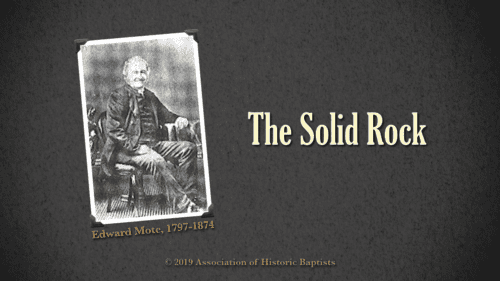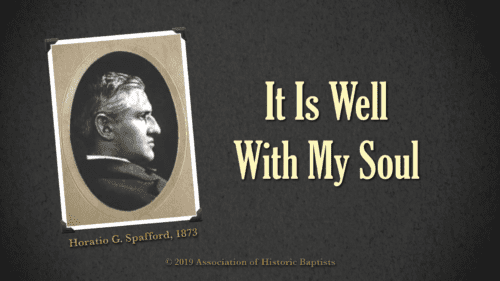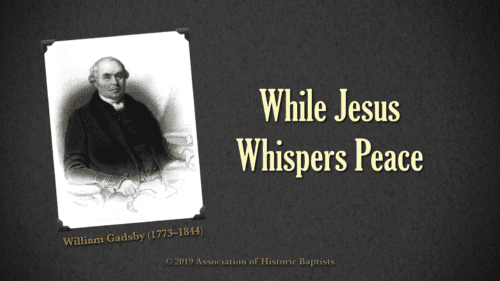Great God! My Maker And My King
Psalm 25:1-22: “Unto thee, O LORD, do I lift up my soul. O my God, I trust in thee: let me not be ashamed, let not mine enemies triumph over me. yea, let none that wait on thee be ashamed: let them be ashamed which transgress without cause. Shew me thy ways, O LORD; teach me thy paths. Lead me in thy truth, and teach me: for thou art the God of my salvation; on thee do I wait all the day. Remember, O LORD, thy tender mercies and thy lovingkindnesses; for they have been ever of old. Remember not the sins of my youth, nor my transgressions: according to thy mercy remember thou me for thy goodness’ sake, O LORD. Good and upright is the LORD: therefore will he teach sinners in the way. The meek will he guide in judgment: and the meek will he teach his way. All the paths of the LORD are mercy and truth unto such as keep his covenant and his testimonies. For thy name’s sake, O LORD, pardon mine iniquity; for it is great. What man is he that feareth the LORD? him shall he teach in the way that he shall choose. His soul shall dwell at ease; and his seed shall inherit the earth. The secret of the LORD is with them that fear him; and he will shew them his covenant. Mine eyes are ever toward the LORD; for he shall pluck my feet out of the net. Turn thee unto me, and have mercy upon me; for I am desolate and afflicted. The troubles of my heart are enlarged: O bring thou me out of my distresses. Look upon mine affliction and my pain; and forgive all my sins. Consider mine enemies; for they are many; and they hate me with cruel hatred. O keep my soul, and deliver me: let me not be ashamed; for I put my trust in thee. Let integrity and uprightness preserve me; for I wait on thee. Redeem Israel, O God, out of all his troubles.”
Benjamin Beddome (1717-1795) was a Particular Baptist preacher and hymn writer. He was appointed the pastor of a church in Bourton-on-the-Water in Gloucestershire, where he served for fifty-five years. As he was in the habit of composing a new hymn for every sermon, he is the author of more than 800 hymns. John Gadsby wrote of him:
“Benjamin Beddome was born at Henley, Jan. 23rd, (old style,) 1717. When about seven years old, his parents removed to Bristol. Having received a suitable education, he was apprenticed to a surgeon and apothecary. The earliest account of any serious impression being made on his mind appears to be an obscure passage found in his handwriting: "Mr. Ware, of Chesham, preached at the Pithay, Bristol, Aug. 7th, 1737, with which sermon I was, for the first time, deeply impressed." At his first awakening, he used to be greatly affected under the word. Though the affectionate ministry of his father, John Beddome, had not gained his attention before, yet he now felt it in a most impressive manner. That he might conceal his abundant tears, he would sit behind in the gallery, where he was not likely to be seen. At the close of his apprenticeship, he became a student at Bristol, and afterwards removed to London. He was baptized by Mr. Wilson in 1739, and joined his church at Goodman's Fields. After the death of Mr. Flower, of Bourton-on-the-Water, Gloucestershire, Beddome was invited to supply the destitute church. He went to them in July, 1740, and having received many calls to become their settled pastor, he accepted the office, and was ordained in September, 1743. In 1749 he had a severe illness, and on his recovery wrote a hymn, which he subsequently replaced by one commencing,
"If I must die, let me die Trusting in Jesus' blood!
That blood which hath atonement made, And reconciles to God."
He had not long been restored to his people ere a new trial awaited them. Mr. Wilson finished his course. His bereaved church at once fixed their eyes on Mr. Beddome, who had formerly been in communion with them, that is, in Goodman's Fields; and so determined were they, if possible, to prevail upon him to remove, that call after call, entreaty after entreaty, and argument after argument, were used, but all in vain. His final answer was, "I would rather honor God in a station even much inferior to that in which he has placed me, than intrude myself into a higher without his direction." In 1770, the Fellows of Providence College, Rhode Island, conferred on him the degree of Master of Arts, as a token of respect for his abilities. My account is taken from Rippon’s “Baptist Register,” and I am sorry to say that it is so almost entirely made up of his abilities, his benevolence, &c, that it is not worth extracting farther. In the near prospect of death, he was calm and resigned. It had been his earnest wish not to be long laid aside from his beloved work of preaching the gospel, and his prayer was remarkably answered, as he was laid by only one Lord's Day; indeed, he was composing a hymn about six hours before he died. He died Sept. 3rd, 1795.”






